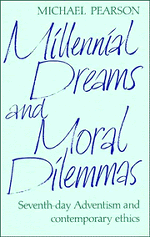Book contents
- Frontmatter
- Contents
- Acknowledgements
- I INTRODUCTION
- II MAJOR INFLUENCES IN ADVENTIST MORAL THOUGHT
- III ISSUES OF HUMAN SEXUALITY
- 5 Marital relations among Adventists: the pursuit of purity
- 6 Adventists and intimacy: the celebration of sex
- 7 Adventists and abortion: early hostility
- 8 Abortion: tensions in the institutionalized church
- 9 Early adventist women: in the shadow of the prophetess
- 10 Adventist women in the modern church: the pain of liberation
- 11 Divorce in Adventism: a perennial problem
- 12 Divorcing and enforcing: problems with principles and procedures
- 13 Homosexuality: the sin unnamed among Adventists
- 14 Homosexuality in Adventism: sin, disease or preference?
- IV POSTSCRIPT
- Notes
- Select bibliography
13 - Homosexuality: the sin unnamed among Adventists
Published online by Cambridge University Press: 29 September 2009
- Frontmatter
- Contents
- Acknowledgements
- I INTRODUCTION
- II MAJOR INFLUENCES IN ADVENTIST MORAL THOUGHT
- III ISSUES OF HUMAN SEXUALITY
- 5 Marital relations among Adventists: the pursuit of purity
- 6 Adventists and intimacy: the celebration of sex
- 7 Adventists and abortion: early hostility
- 8 Abortion: tensions in the institutionalized church
- 9 Early adventist women: in the shadow of the prophetess
- 10 Adventist women in the modern church: the pain of liberation
- 11 Divorce in Adventism: a perennial problem
- 12 Divorcing and enforcing: problems with principles and procedures
- 13 Homosexuality: the sin unnamed among Adventists
- 14 Homosexuality in Adventism: sin, disease or preference?
- IV POSTSCRIPT
- Notes
- Select bibliography
Summary
The unnamed sin
Homosexual practice has traditionally prompted severe condemnation from the Christian church. Indeed, it became known as the sin ‘inter christiani non nominandum’. Such thinking has long informed public opinion and the law in many countries including the United States, where legislation, enacted in the seventeenth century, made it punishable by death in some places. Although homosexual practice ceased to be a capital offence in the nineteenth century, only very recent legislation has mitigated the harshness of the law on homosexual behaviour. The reasons why people across such a broad social spectrum and over such a long period of time have had such a deep aversion to homosexual practice are no doubt very complex. Underlying them all perhaps is the sense that anyone who engages in what seem to the majority to be deeply ‘unnatural’ acts is ultimately capable of betraying any of the foundational values for which their society stands. The very strength of this prejudice makes homosexuality difficult to trace until comparatively recently. Those who recognized homosexual needs within themselves either repressed them for fear of the consequences of expressing them, or were very careful about seeking to satisfy them. Thus, although it is commonly believed that the proportion of homosexuals in the population has remained roughly consistent, evidence concerning actual practice remained sparse until the period of so-called ‘gay liberation’ after the Second World War.
- Type
- Chapter
- Information
- Millennial Dreams and Moral DilemmasSeventh-Day Adventism and Contemporary Ethics, pp. 229 - 234Publisher: Cambridge University PressPrint publication year: 1990



